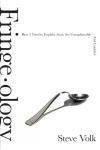
Chapters discuss extra-sensory perception; Stuart Hameroff and theories about consciousness and the mind-brain relationship; the sad story of Elizabeth Kübler-Ross and her work on near-death experiences and death-bed visions, and how her reputation was damaged by her association with dubious characters later in her career; ghosts and poltergeists; a case study of a small town in Texas which became briefly famous as a UFO hotspot, focusing on how the townsfolk handled the situation; spirituality, prayer and meditation; lucid dreaming; the possible paranormal aspect of Allan Botkin’s ‘Induced After-Death Communication’ technique, and much else. Volk interviewed a large number of people, some very well known in the field, and presents their ideas lucidly, even when talking about such arcane subjects as quantum mechanics and microtubules.
The aim is to try to make sense of what is going on and chart a way forward that acknowledges the radically different conclusions reached by ‘sceptics’ and ‘believers’. This highlights consensus-building to find a middle way between two sides that often appear irreconcilable, a kind of ‘tertium quid’ if you will, to borrow the phrase Edmund Gurney used for one of his books (Gurney’s subtitle, ‘Chapters on various disputed questions’, would have suited Fringe-ology as well). During his research Volk saw intellectual communities largely isolated from each other looking at the same subject from different standpoints, reflexive emotion all too often taking the place of reason, each side speaking but not listening and thereby failing to engage in fruitful dialogue.
He found that far from having a monopoly on the forces of neutral logic, the supposedly supremely rational sceptics are as invested emotionally in their beliefs as those in the opposite camp. As he points out, one just needs to look at a typical copy of Skeptical Inquirer: he quotes Elizabeth Mayer likening it to a ‘fundamentalist religious tract’. (The problem with using the sceptic/believer shorthand is that it suggests a binary divide between objective investigators versus credulous types who rely on belief and intuition rather than an assessment of the evidence, when the situation is more complex.) The media compound the situation by unhelpfully trivialising stories, seeking opinions at the extreme ends of the spectrum in a bid to create controversy rather than examining a story in a nuanced way.
Volk notes the low tolerance we have for ambiguity that creates a narrowing of our vision: we see what we expect to see, interpret it to fit in with existing schema, and downplay alternatives lacking conformity with our view of the world. According to his analysis the bit of our brain at fault is the amygdala, which once held huge importance for our survival by processing potentially dangerous stimuli. Now, in modern civilisation, it is mostly confined to mundane matters yet it still generates an emotionally-laden defensiveness towards ideas that we find uncomfortable. The result is an inclination to seek confirmatory data, reinforcing our beliefs as an integral part of our self-identity while ignoring anything that contradicts them, because contradiction creates anxiety and our cognitive processes strive to reduce anxiety. Reduction is always easier by rejecting conflicting information than by attempting to combine it with an established outlook.
Volk’s key point is that broadening perspectives will help us to arrive at a more profound understanding. That’s the theory anyway. In practice he concedes it is hard to achieve such a delicate balance, especially as there is a propensity in society to be dismissive of anything associated with what he terms ‘paranormal taint’. Despite these difficulties, we can keep looking, and it is important not to stop asking questions because the worst thing we can do is assume that we are in possession of all the answers. What we need to appreciate is that our knowledge is always provisional and subject to amendment in the light of fresh evidence. We have to retain a balance between an open mind and a careful evaluation of the evidence. Doing so will allow a greater tolerance of diverging opinions, even when we are uncertain about their relative merits and the amygdala is sending frantic signals that it isn’t very happy about it.
A desire for a rapprochement between the two sides in the dispute is admirable, but it is fairly certain that Volk will appeal more to what he calls the believers than he will to what he doesn’t call the pseudo-sceptics, because their situations are not symmetrical. If you think that paranormal forces are active in the word you will be happy to see scientific principles underpin them and so will welcome an attempt at synthesis, co-opting what you need; whereas if you repudiate the possibility of the paranormal you will already consider science a sufficient method for comprehending the world with no necessity for the addition of non-scientific elements (or woo-woo if you want to be reallycontemptuous). The difficulty can be seen in the respective approaches to quantum mechanics, an area to which Volk devotes a fair amount of space.
Further, I’m not sure the book’s subtitle, ‘How I tried to explain away the unexplainable – and couldn’t’, makes sense because if something is unexplainable then it can’t be explained, or explained away for that matter, but lies outside rational enquiry. Rather, the intention is to examine the unexplained, which may turn out to be unexplainable; but may eventually be explained and become part of our standard world view. Volk is clearly aware of this, which suggests that the subtitle is the result of carelessness rather than some epistemological position on the subjects under scrutiny.
There is too a problem lumping so many disparate subjects together and then sliding from psychical to spiritual to religious as if they are all on same level. This is apparent in his account of the 2009 Parapsychological Association convention at which Charles Tart made many of the delegates fidget at his talk of spirituality and God. Volk shifts glibly between a discussion of topics like exceptional human abilities and whether the personality survives bodily death to talking about religion. But matters which are the subjects of scientific investigation (such as psi and survival) do not necessitate a religious, or for that matter spiritual, underpinning because they are not matters of faith, which is why ‘believer’ is an inappropriate term. Having said that, Volk’s open-handedness makes it difficult to disagree with him and not suspect some illiberal activity on the part of one’s amygdala to be the cause. If I think that, for argument’s sake, spirituality does not provide a useful way of understanding reality, or NDEs cannot provide strong evidence for survival of bodily death, am I closing down debate and excluding the possibility that their supporters might be on to something?
Fringe-ology is clearly written and covers a large amount of ground in an accessible non-technical manner and would make a useful introductory reader. A drawback to the breadth is that Volk cannot deal with any topic in great depth, but there is an extensive reading list for further exploration If he can help in some measure to make the debates (which can be intensely hostile) less heated and more civil, he will have done a useful service to those engaged in exploring the world of, to use another of his favourite expressions, ‘hoo-ha’. It’s either that or find a way to perform amydgalectomies on the entire population to make it more tolerant of contradictory opinions.
A separate review by Robert A Charman, appeared in the Journal of the Society for Psychical Research, July 2013.

